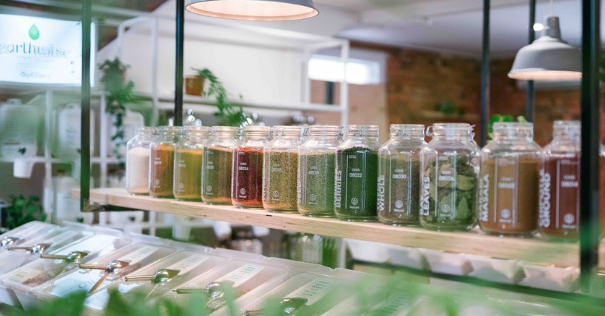Plastic free and on trend: GoodFor founder James Denton’s vision for retail

There’s some sly strategy behind the Insta-friendly fit-out and slick branding of James Denton’s new packaging-free grocery start-up GoodFor: he’s deliberately disguised his business as “a very trendy place to come” to increase the reach of its anti-waste, eco-friendly message.
 “We wanted to create something that was doing something good, but was also not preaching to the converted,” Denton says.
“We wanted to create something that was doing something good, but was also not preaching to the converted,” Denton says.
He explains that the branding itself was a lucky break, made within just five days by an agency associated with his designer brother-in-law as a kind of practise exercise in creating a small brand identity. It would’ve cost thousands if Denton had approached the agency conventionally, he says.
Denton’s own career has been far from conventional. He trained as an accountant before working as “a real cowboy chef” on superyachts. From there, he established Queenstown taco restaurant Taco Medic, but sold his shares in the business to open GoodFor.
GoodFor went from conceptualisation to launch day in just four months.
“I’m a terrible accountant, but it gave me some good foundations,” Denton says.
GoodFor’s stores emphasise an educational kind of experiential retail that Denton is looking to ramp up as the company grows with demonstrators and talks.
“It really is a slow style of shopping, and we’ve noticed that people do like to spend a lot of time in the store.”
A long centrepiece installed in the recently-opened Parnell outlet with the intention of having staff pack online orders on it has instead been adopted by customers as a kind of kitchen table for relaxing against. Denton likes this unintended effect, and wants to repeat the feature in future stores.
“We definitely want the stores to be really educational, and just a place where people can come and relax.”
Denton feels current trends towards replacing staff with technology is counter-productive as human contact is crucial to a good retail experience: “I feel like it’s a much funner way of doing things.”
Rather than identifying with the mainstream grocery market, he considers GoodFor as something more akin to a farmer’s market or Farro Fresh. Denton thinks the retailers currently removing plastic bags from their offering are making a good move, but notes that plastic bags are “the very start” of addressing the wider issue of plastic waste in retail.
“There’s just so many companies that could make tiny little changes that would probably be cost-effective for them,” Denton says.
He says petroleum-based plastic cups given out by drinks companies, plastic-based wrappers and straws should all be addressed.
Denton predicts GoodFor will “probably do quite well for a number of years”, but expects a series of welcome events will eventually render its plastic-free point of difference redundant. These are: 1) the use of petroleum-based plastic packaging will be banned; 2) commercial composting facilities for food waste and compostable packaging will become more widely available; 3) “everything” will need to be compostable.
Judges’ comments from James Blackwood:
James Denton’s GoodFor is both timely and inspirational. In a substantive case of “if you build it, they will come”, he has read the zeitgeist perfectly. Two stores in less than 12 months, a social contract with customers, beautifully presented, passionately advocated and with a clear reason for being.
To give credit where it’s due, Jim Kebbell and Marion Wood who founded Commonsense Organics were also singled out for their remarkable vision that pioneered sustainability and ethical business practices more than 25 years ago. As was Lawrence Railton, for AS Colour’s unassailably successful global model.
Nominees:
Jim Kebbell and Marion Wood, Commonsense Organics; West, Ethique; Simon Pound, Ingrid Starnes and Previously Unavailable; Tilly Lloyd, Unity Books; Lawrence Railton, AS Colour; Adriana Christie, The Pallet Kingdom; Peter Cullinane, Lewis Road; James Denton, GoodFor; Rachel Hansen, Freedom Kids.
People’s choice
Peter Cullinane, Lewis Road
This article originally appeared on The Register.




